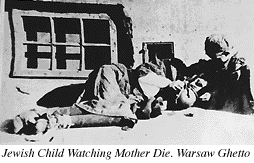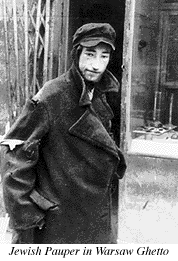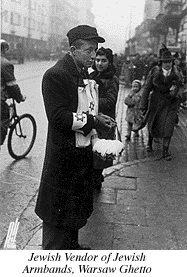
 The Warsaw Ghetto:
The Warsaw Ghetto:
JOHN DAMSKI: But something happened in relation to Jews and myself just before the war with Russia. Again, my boss told me we needed more electricians. I gave him an idea about how to find them.
"Why don't you send me to the Warsaw ghetto? I'll find some Jewish electricians there."
I also needed to buy welding equipment for the company that I knew I could get in the ghetto. Enderlein thought it was a brilliant idea. The truth is, I also had a little business to do there on the side; after all, I had to make a living.
Every one of those Jews who were working for me was from Warsaw; they all had relatives in the ghetto. When I announced I was going to the Warsaw ghetto to find electricians, they all wanted to come with me, to see their families, and bring them some food.
"Okay, I'll take four or five of you, but no food."
It was dangerous; we could have been stopped. They all agreed; they just wanted to see their families. I got a special travel permit from my boss that said, "John Damski is going to Warsaw to arrange for some electricians, badly needed for airfield construction work."
We left early in the morning in an Opel-Blitz, a very fast truck. Up front with me were two German Luftwaffe (Airforce) guys: the driver and his assistant. We were speeding down the road pretty fast--it was just great--then we had the accident. Coming out of a curve too fast, the driver lost control, and our truck rolled over three times. The two Germans and I weren't hurt, although I was pretty lucky because a piece of glass had cut right through my shoe. Then I remembered the Jews in the back with the big heavy propane bottles. I went to see what had happened. They were screaming. One fellow got it in the back, and Feigenbaum had a big gash in his forehead.
"I'm mutilated!" he cried.
He was an extremely handsome fellow, and all he could think about now was that he might have a permanent scar.
I had a different worry: a huge seventy kilo slab of pork that I was planning to smuggle into the Warsaw ghetto, was laying in the ditch a few yards off. As soon as we could, one of my drivers and I picked it up and walked over to the nearest farm house, where I left it with the farmer for temporary safekeeping.
When I got back to the truck I could see a line of troops coming down the road. At the head of the column was a colonel in his black car. Seeing our overturned truck, he stopped to ask what was going on. My two German drivers were still shaking; I think I was the only one who stayed cool.
"We had an accident," I said.
"Do you have any injured people?" the colonel asked.
"I have several."
"Okay, take them to the hospital."
Impossible--they were Jews. The colonel assumed we were all Germans. He ordered his men to turn our truck upright, but they couldn't budge it. So he gave me his car and driver, and I loaded all five Jews into it. What else could I do with them? My two Luftwaffe drivers stayed behind with our truck, while the Jews and I went on to Warsaw. They were not too badly injured, and in any case, I couldn't very well take them to the Warsaw hospital. The only place for us was the ghetto, and that's where we went.

Entering the Warsaw ghetto was a shock. It was as if somebody suddenly dropped you into an entirely different world. The buildings and the streets were the same as the rest of Warsaw, but the atmosphere overwhelmed you. There was something about it that you could not describe. I went about fifty yards, and saw a guy lying on the sidewalk with his hand outstretched. He must have been sixty years old. He said, "Give me a piece of bread." Just that. I will never forget it in all my life.
 Staying in the ghetto those five days was a devastating experience. As a Gentile I really had no business being there, and could not move around easily. To make myself less conspicuous, I put on an armband with the star of David. Wearing it gave me a very strange feeling. You feel that you are not human. You feel like a marked man. It's hard to believe--just from an armband--but once you put it on, it's like having a number in a prison. The armband made me feel so bad, finally I said to hell with it, and took it off.
Staying in the ghetto those five days was a devastating experience. As a Gentile I really had no business being there, and could not move around easily. To make myself less conspicuous, I put on an armband with the star of David. Wearing it gave me a very strange feeling. You feel that you are not human. You feel like a marked man. It's hard to believe--just from an armband--but once you put it on, it's like having a number in a prison. The armband made me feel so bad, finally I said to hell with it, and took it off.
We made contact with the people we needed. I also got in touch with my boss in Zamosc and told him about the accident; he said he would send another truck. I bought the welding equipment and some other items only obtainable in the ghetto. The Germans could get us the equipment too, but it took a long time, and we needed it right then. The Jews were manufacturing everything imaginable in the ghetto, even Swiss watches. I still have a gold watch from those days. The movement was from Switzerland, but the watch was made in the ghetto.
Finally the new truck arrived from Zamosc to pick us up. First thing, I went back to the farmer for my pork. "What pork?" he said. Without a word, I turned the truck around and left, returning pretty soon with my two German drivers and their pistols. Right away the pork appeared, and the pork fat too. During the war fat was very important. You might not have much to eat, but if you had a little fat and some potatoes, it was a meal; it didn't matter whether or not it was kosher.
Back in the ghetto, we pulled the truck up to a gate, sold the pork and fat, and loaded up our new equipment. It all had to be done very fast, so that no one would be caught. For some reason it was taking longer than it should have.
"Is everybody ready?" I asked at last. Something seemed odd to me; it was too quiet. I looked over at the Jewish guys I had brought with me. One had disappeared into the ghetto, but the other four were going back. Then I happened to glance under the canvas covering the back of the truck and I saw about ten other Jews pressed flat on the floor. They thought I wasn't going to see them.
I had to make a split-second decision. I don't know why I risked it; you never know why you do things like that. I said, "Okay fellows, keep quiet," and off we went. I didn't say anything to the German drivers. When we got to the ghetto entrance gate the S.S. guard looked in the cab and saw two German soldiers--the drivers--and me, a civilian. He probably thought we were all right. He never looked in the back.
About twenty miles out of Warsaw we made a stop. I told the Jewish guys, "Now get out, you're on your own. You're well out of the ghetto." I asked each one to give me what he could--100 or 200 zlotys--I don't remember exactly how much, but it was a very small sum. Altogether I collected 3,000 zlotys and gave it to the drivers to keep them quiet. It was not much, but for the drivers, who were paid 150 German marks a month, it was like getting ten times their monthly wages on the black market; they were happy. The money shut them up, and after that no one ever mentioned it. Those ten guys disappeared and I never saw them again. They may still be alive. I hope so.